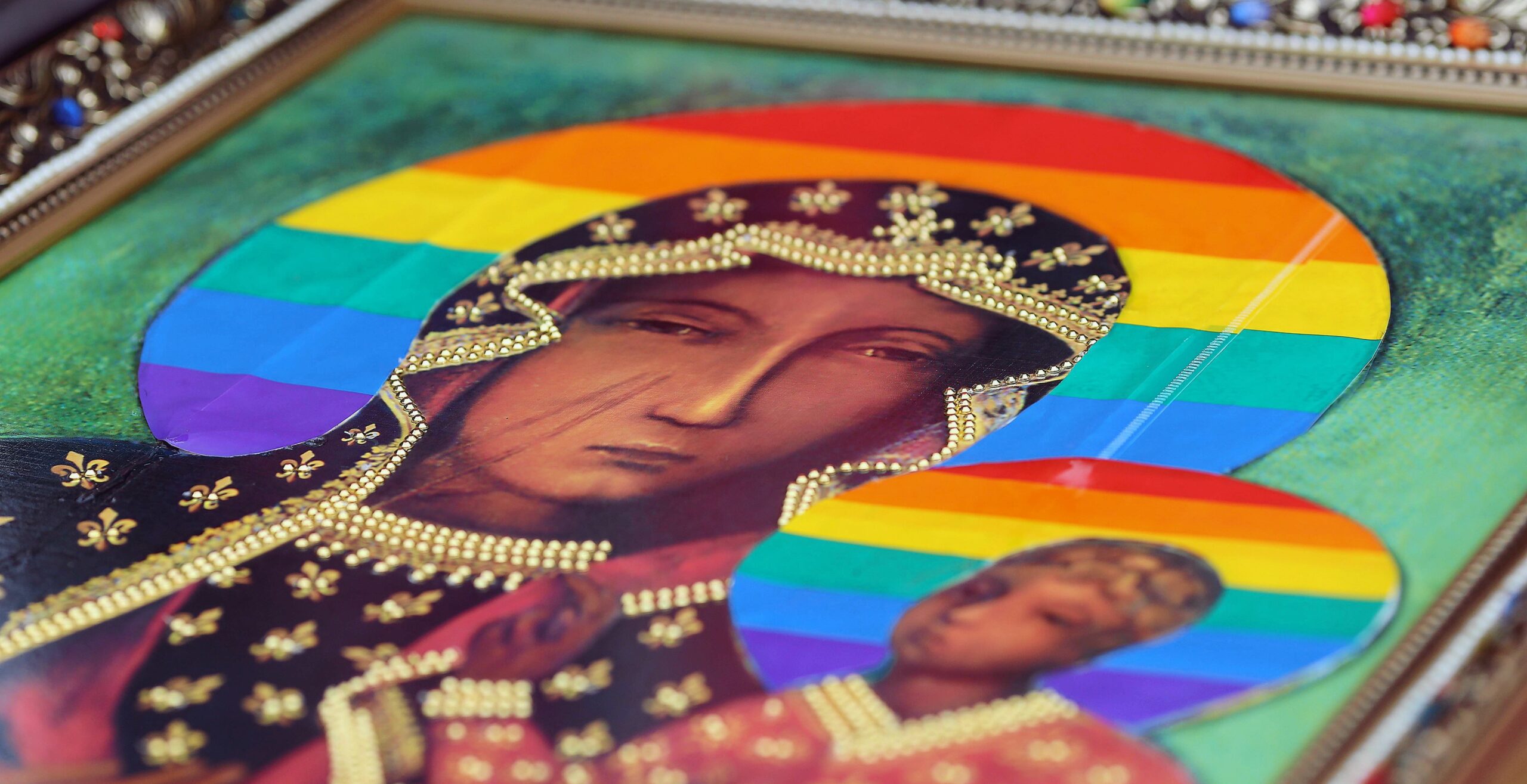Three LGBT activists have been found not guilty of the crime of offending religious feelings, which carries a potential prison sentence of up to two years in Poland.
The charges stemmed from their involvement in producing and distributing images of the Virgin Mary and Jesus with rainbow colours added to their halos. The so-called “Rainbow Virgin Mary” has become a symbol of LGBT rights protesters in Poland.
The case against Elżbieta Podleśna, Anna Prus and Joanna Gzyra-Iskandar has drawn international attention. Human rights groups have accused the Polish authorities of “harassment” against the activists.
Naklejki z Matką Boską w tęczowej aureoli nie obrażają uczuć religijnych – orzekł sąd.https://t.co/An4kacwWyO
— Michał Wojtczuk (@MichaWojtcz) March 2, 2021
Today, a court in the town of Płock found the three women not guilty. “The activists’ actions were provocative, but aimed at drawing attention to a homophobic and hurtful display in a church in Płock,” said the judges, quoted by Gazeta Wyborcza.
“It was not the intention of the activists to insult anyone’s religious feelings nor to insult the image of the Mother of God,” continued the judge. “Their activities were aimed at protecting people who were discriminated against.”
The incident in question took place in April 2019. A church in Płock had created a display showing a series of negative terms, such as “hate”, “selfishness”, and “jealousy”. Among them were also “LGBT”, “homo-depravity” and “gender”.
Jak zamienić świątynię w szczujnię? Ano tak. Tak wygląda Grób Pański w parafii Maksymiliana Kolbego w Płocku. LGBT, gender, homoseksualizm obok chciwości, zboczeń, zdrady. #PedofiliaWKościele brak.
Foto: Magdalena Bielska. pic.twitter.com/2A6hLhGOIy— Robert Maślak (@RobertMaslak) April 20, 2019
In response, Podleśna, Prus and Gzyra-Iskandar put up stickers around the church containing an adapted image of The Black Madonna of Częstochowa, a venerated Catholic icon of the Virgin Mary and Jesus housed at Poland’s Jasna Góra Monastery.
The three activists were indicted under article 196 of the Polish penal code, which states that “anyone who offends the religious feelings of other people by publicly insulting an object of religious worship of place intended for public performance of religious rites” may be fined or sentenced to up to two years in prison.
At the trial, prosecutors had called for the defendants to receive six months of community service as punishment for the crime.
Police had previously raided the flat of Podleśna, confiscating electronic equipment and detaining the activist. The interior minister at the time, Joachim Brudziński, declared that “freedom and ‘tolerance’ do not give anyone the right to offend the feelings of believers”. He described the stickers as an act of “cultural barbarism”.
In response, activists put up posters with the rainbow Virgin Mary image and the legend “Rainbows don’t offend” on a number of churches in Warsaw as well as around the offices of the ruling national-conservative Law and Justice (PiS) party.
The image resurfaced in Częstochowa itself in June 2019, when it was displayed by protesters at an LGBT march in the city. It quickly became a symbol of the LGBT rights movement in Poland.
Uraziła cię Tęczowa Matka Boska na #MarszRówności w #Częstochowa? Zgłoś się na policję.
Przepraszam, ale już samo to pytanie jest dla mnie tak absurdalne… Nie, to nie jest @ASZdziennik. To się dzieje. Czytajcie o szczegółach na @zachodni. @k_jurkiewicz https://t.co/4bAuwEF2XX pic.twitter.com/KkHFsgTTxu— Bartosz Wojsa (@BartoszWojsa) November 13, 2019
A number of Polish and international human rights groups condemned the case against Podleśna, Prus and Gzyra-Iskandar. Human Rights Watch called it “the latest attempt by Polish authorities to target LGBT and gender equality activists”.
Amnesty International called for the “absurd” charges against the activists to be dropped, describing them as “harassment”. “Everyone has a right to express themselves…even when some people might be offended by our expressions,” said Amnesty.
Tweeting from the courtroom today, Amnesty celebrated the acquittal and “called on authorities to refrain from targeting and harassing any other peaceful activists simply because of their activism”.
The hearing is now over. Ela, Joanna and Anna have been acquitted as their actions are protected by the right to freedom of expression. We call on authorities to refrain from targeting and harassing any other peaceful activists simply because of their activism #TeczanieObraza pic.twitter.com/dlapOzx0JY
— Amnesty Polska (@amnestyPL) March 2, 2021
The case against the activists had been supported by Ordo Iuris, an ultraconservative legal body, Kaja Godek, Poland’s best known anti-abortion activist, as well as a former parish priest from the Płock church.
“This profanation of the image of Our Lady of Częstochowa deeply wounded my religious feelings,” said the priest, Tadeusz Łebkowski, quoted by Gazeta Wyborcza. “The [LGBT rainbow] flag has become for me a symbol of repulsiveness, aberration and deviant acts.”
“The accused put up modified images [of the Virgin Mary] during the most important holiday for Catholics, Easter,” said Magdalena Majkowska of Ordo Iuris. “They understood what the Mother of God means to Catholics. [They called for] respect for every human being [but] denied respect to Catholics.”
Prosecutions for the crime of offending religious feelings are becoming more common in Poland. By the start of December last year, 29 such indictments had been filed in 2020, compared to ten in the whole of 2016, notes Dziennik Gazeta Prawna.
Main image credit: Maciek Skowronek / Agencja Gazeta

Daniel Tilles is editor-in-chief of Notes from Poland. He has written on Polish affairs for a wide range of publications, including Foreign Policy, POLITICO Europe, EUobserver and Dziennik Gazeta Prawna.



















